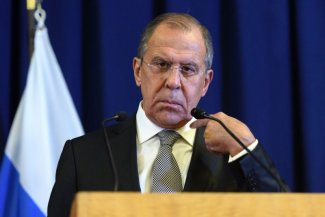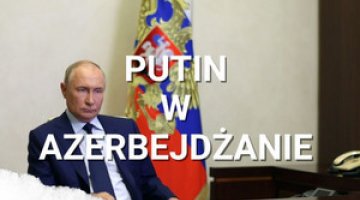Russia playing on the Libyan conflict

On 13 January in Moscow, Russia and Turkey made an attempt to convince the two warring sides in Libya – the Government of National Accord led by Prime Minister Fayez al-Sarraj and the parliament-backed commander of the Libyan National Army, Khalifa Haftar – to sign a truce. The document would have served as confirmation of the ceasefire announced on 12 January and would have created a mechanism for its monitoring. It envisaged, inter alia,granting Russia and Turkey the status of the truce’s guarantors, which would have made it possible to shift the conflict to the political and diplomatic platform. This attempt failed: the two warring sides would not talk to one another directly (Russian diplomats mediated between them), and Haftar left Moscow without signing the document. As a consequence, the truce in Libya was broken, and the Turkish president, Recep Tayyip Erdoğan, accused the Russian side of failing to comply with informal obligations to ensure Haftar’s signature.
Russia supplies military equipment to Haftar, hundreds of mercenaries from Wagner (the ‘private’ Russian military campaign) are fighting on his side and, according to unconfirmed reports, he is also supported by Russian military advisors. In turn, the Turkish government passed a parliamentary resolution authorising it to send Turkish troops to Libya. Furthermore, at the beginning of January, it first sent members of pro-Turkish irregular military formations from Syria to Turkey and then sent Turkish military advisors and electronic warfare systems and their operators.
The situation in Libya coincides with the escalating conflict in Syria’s Idlib, where government troops backed by Russian air forces launched another offensive in December against the forces of armed Syrian opposition supported by Turkey. It is also worth noting that Turkish soldiers deployed at the observation and control points in Idlib (with the intention of monitoring the previously agreed truces) also found themselves in the line of fire. During the meeting in Istanbul on 8 January, Putin and Erdoğan reached an agreement on ceasefires in both Idlib and Libya.
The Libyan meeting in Moscow was preceded by Chancellor Angela Merkel’s visit to the Kremlin on 11 January. Putin hinted in his statement during the press conference ending the meeting that Russian participation was a necessary condition for stabilising conflicts in the Middle East (not only in Libya but also in Syria), emphasising the threats the conflicts pose to Europe, such as the resulting waves of refugees. The Russian leader also emphasised that he shared Europe’s interest in convincing Iran to comply with the nuclear programme restrictions imposed by the deal between the ‘six’ and Iran in 2015.
Commentary:
- Since the first news regarding the meeting appeared on 12 January, only one day ahead of the meeting, it can be concluded that the Kremlin made the decision to hold it very late (shortly before or possibly after President Putin’s talks with Chancellor Merkel on 11 January). The meeting was unsuccessful partly due to the hasty manner in which it was organised, while the haste was most likely dictated by the fact that a peace conference concerning Libya is due to be held on 19 January in Berlin.
- The formula of the Moscow meeting envisaged that the ministers of Defence and Foreign Affairs of Turkey and Russia, i.e. the countries offering military and political support to the warring sides (Turkey to Sarraj, and Russia to Haftar), would be able to exert pressure on the sides they support sufficient to convince them to sign the truce. The deal would eradicate the risk of a proxy war between Russia and Turkey in Libya.
- A successful Russian mediation resulting in a truce in Libya would have also strengthened the image of Russia as a power capable of replacing the United States in the Middle East as the region’s key stabiliser. The Kremlin wants to use this image to convince European countries – above all Germany, France and Italy – that Russia can be a valuable partner. It wants to show that co-operation with it will help resolve a task which Europe has been unable to cope with, namely the stabilisation of the Middle East and North Africa, which would halt the wave of refugees which poses one of the most serious problems to Western European politicians and societies. At the same time, the Kremlin hopes that it can expect some kind of reciprocity in exchange for its ‘stabilisation services’. One example of this would be Europe at least partially recognising Russia’s geopolitical aspirations. Moscow in particular means by this the de facto acceptance of the annexation of Crimea, forcing Ukraine to accept the Minsk accords in the Russian interpretation, loosening the transatlantic bonds and – in the maximum version – adopting the Russian concept of European security architecture.
- Opportunities result from the Donald Trump administration’s inconsistent policy. Moscow is taking advantage of these to convince Europeans that partnership with Moscow will allow for the resolution of more problems than the traditional alliance with the USA. This is an important element of this Russian move. Such an opportunity, for example, emerged when the United States withdrew from the JCPOA deal with Iran. Russian diplomacy has been making consistent efforts to make Europeans believe in the illusion that their co-operation with Russia against Washington will enable them to curb Iran’s nuclear ambitions and at the same time derive economic benefits from co-operation with it. The partial evacuation of US forces from Syria offers a similar opportunity to Russia. Given this situation, Moscow is trying to convince Europeans to accept the Russian viewpoint that recognising Assad’s victory in the civil war and financing the economic reconstruction of Syria will be the best way to stabilise the situation in this country.
- Berlin seems to be the main object of Russian efforts at present. It could be noticed during the meeting of President Putin and Chancellor Merkel on 11 January in Moscow that Putin understood Berlin’s serious concern about the escalating destabilisation of the Middle East and the great significance which Chancellor Merkel attaches to her initiative of holding a conference targeted at resolving the Libyan crisis. Putin made efforts to present himself as a politician who holds the key to stabilising the situation in Libya without whose support the German initiative would have no chance of success.




